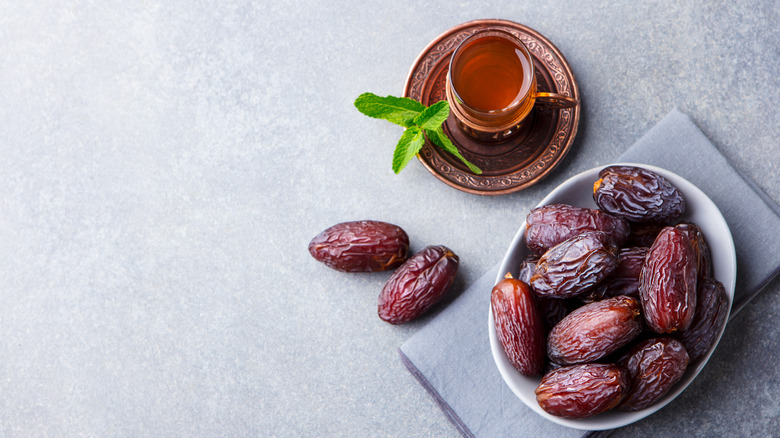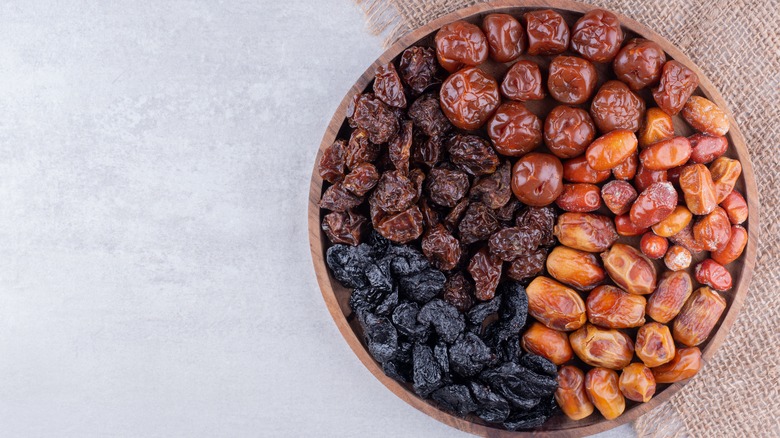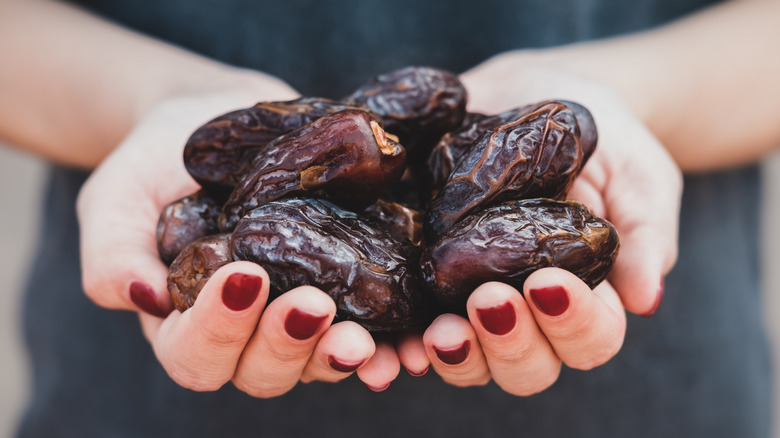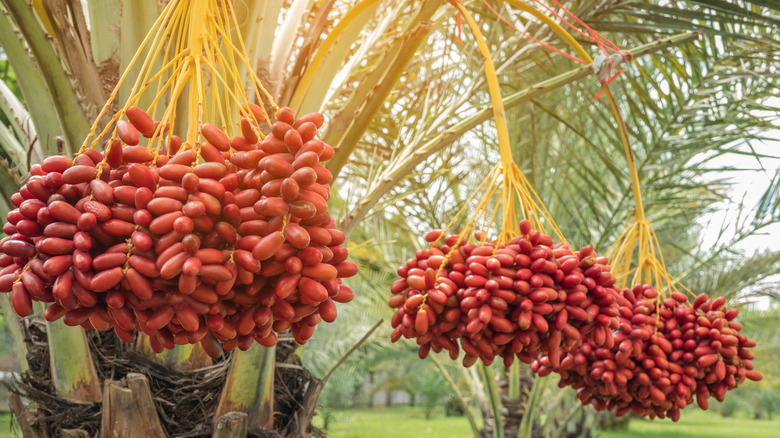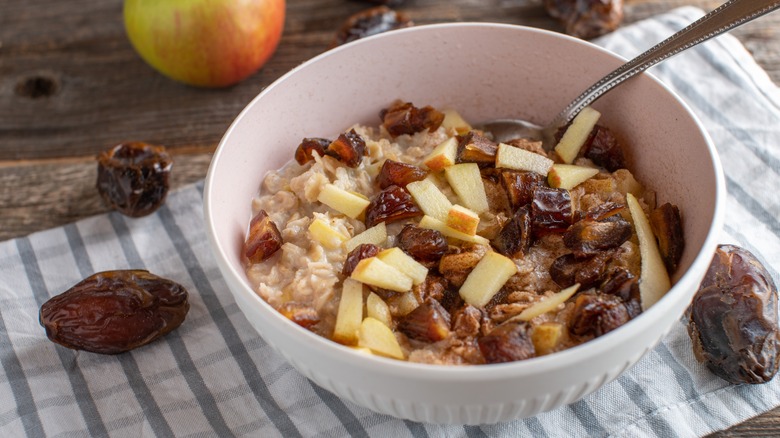What Makes Medjool Dates Unique?
Dates are the perfect sweet addition to a smoothie, salad, or dessert, and they're just as delicious eaten alone. While it's possible to eat them fresh, they're often eaten dried due to the concentrated sweetness produced once the fruit is dehydrated. With dates seeming to be as old as time, these candy-like fruits are in extremely high demand, with California producing 49,300 tons from 12,500 acres in the year 2020 (via The Agricultural Marketing Resource Center). However, when looking at the top countries to produce dates, the United States doesn't even make the list. With Egypt being the top producer of dates in the world, other countries trickling closely behind are Iran, Algeria, Saudi Arabia, and the United Arab Emirates.
Like many fruits, dates come in plenty of varieties, but one stands out as a favorite across the globe. Here, we'll examine why Medjools are known as the "king of dates."
Medjool vs. Noor Deglet
Whether you've got a sugar craving or simply love the natural flavor, the taste is just the tip of the iceberg on the benefits this fruit has to offer. According to Woodspur Farms, the two most common types of dates in the United States are Medjool dates and Noor Deglet dates, with Noor Deglet dates surprisingly being a bit more popular. Medjool dates are much sweeter than Noor Deglet dates, so much so that the variety is often used as a sugar substitute. Noor Deglet dates lie more on the bitter side, with a nutty taste resembling cashew butter or browned butter.
There are other major differences between the two varieties of dates. For instance, Medjool dates originate in Morocco, while Noor Deglet dates are from Algeria. Medjool dates are large and light in color, and Noor Deglets are small and dark in color. Because Medjool dates cater to those with substantial sweet tooths, they are sometimes called "nature's candy" or "baker's choice."
Medjool date nutrition
Not only do Medjool dates provide the perfect sweet-and-salty balance with dishes like devils on horseback, but their abundance of health benefits makes them even more appealing. According to Real Simple, they're loaded with antioxidants and packed with potassium, fiber, magnesium, copper, iron, and vitamin B. With these essential nutrients, dates can reduce the risk of heart disease and some cancers, regulate blood sugar levels, your central nervous system, muscle contractions, and blood pressure, lower cholesterol, strengthen your bones and immune system, and much more. In addition, dates have been found to help ease labor pains in pregnancy and lower inflammation, aiding brain health (via Healthline).
Their high levels of carbohydrates provide sufficient fuel to energize you throughout the day. They're a bit more calorie-dense, as one Medjool date averages around 66 calories. Nutritionally, they're similar to other dates; however, Woodspur Farms notes that Medjools have a higher fructose content and very little sucrose, while Noor Deglets have equal parts fructose, sucrose, and glucose.
How they're harvested
NPR states that the term "king of dates" often refers to Medjool dates. As noted earlier, Medjool dates originate in Morocco, but many don't realize that this sweet fruit was once only meant for royals and the wealthy because of its high cost. The intense labor associated with cultivating Medjool dates was to blame.
Dates are grown on date palm trees. To extract the most fruit, growers are required to hand-pollinate each tree. To do this, the worker must climb each tree several times during the growing season, and the trees are usually 40 to 50 feet tall. Once they're at the top, it's crucial to trim the extremely sharp thorns, which are usually 4 to 5 inches long. From there, the grower must remove the ripe dates for them to get proper airflow and sunlight exposure so that they reach their full size. The fruit must then be covered in burlap or nylon to prevent birds, insects, and rain from harming them. The worker must continuously do this as the remaining dates ripen, which is tedious, dangerous, and requires a lot of energy. Medjool dates are picked individually, compared to other varieties that are collected in clusters. This makes them quite the delicacy.
How to use dates in your diet
If you're wondering how to sneak this sweet superfood into your diet more often, The Smithsonian has a few genius recommendations. You can stuff them using your favorite soft cheese or nut butter of choice, bake them into cakes, cookies, breads, and even pies, chop them and add them to salads, sandwiches, or pasta dishes, and puree them into sauces, marinades, and vinaigrettes. Let's face it, this sugar substitute is good enough on its own, so it can only elevate what it's paired with. However, they do go bad, and checking in on them before using them is necessary.
According to Foods Guy, if your dates have grown spots or mold, have unwanted guests like insects or worms in the container, or smell off, chances are they're no longer good to eat. As a rule of thumb, dates can be stored in a sealed container at room temperature for up to six months, in the refrigerator for up to one year, and in the freezer for up to 3 years.
